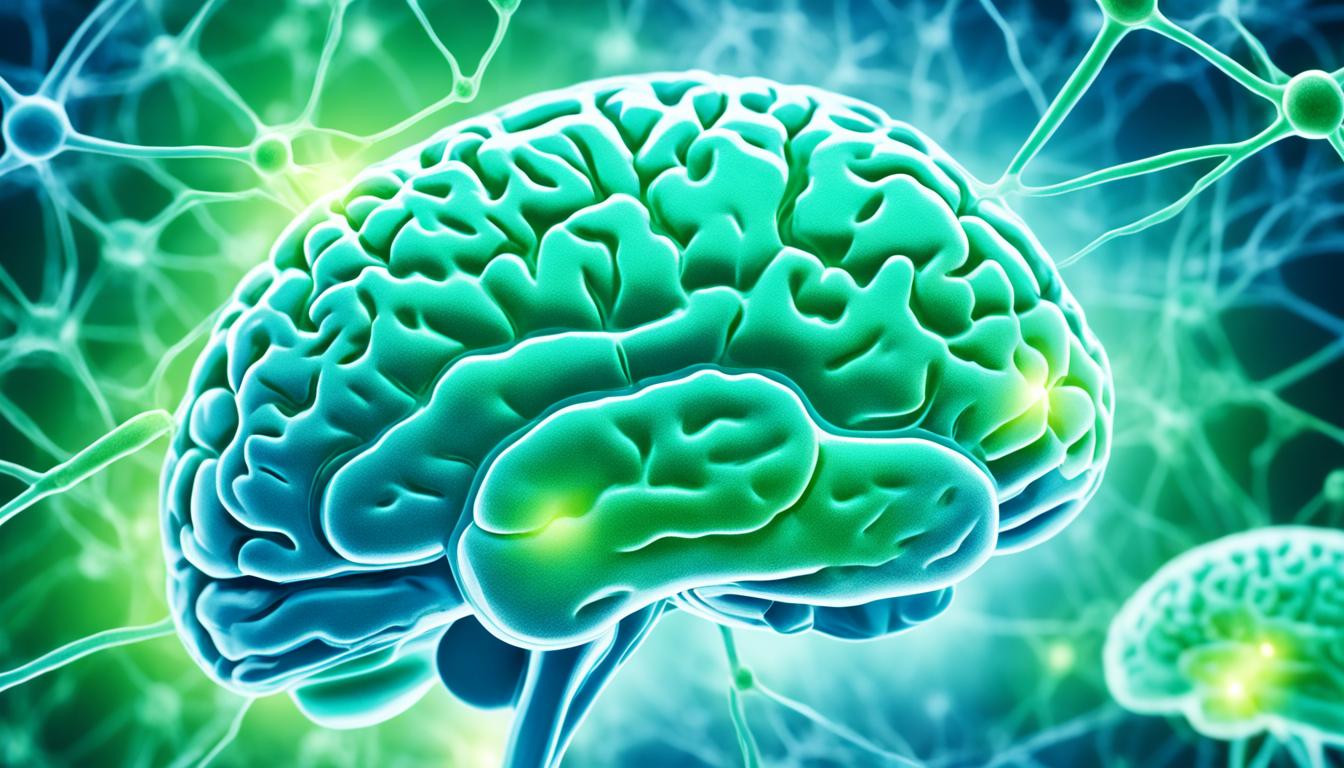Serotonin syndrome is a dangerous condition. It happens when there’s too much serotonin in the brain. Causes include taking certain medications, mixing drugs, or overdosing on purpose.
The signs of this syndrome can differ in how serious they are. They might have effects on the mind, body, and muscles. Early spotting and proper care are very important for getting better.
Right now, doctors are looking into using stem cell therapy for treating serotonin syndrome. This treatment gives new chances for those affected. It tackles the chemical imbalance and helps regrow brain tissue.
Key Takeaways:
- Serotonin syndrome can be life-threatening because of too much serotonin in the nervous system.
- Causes include taking certain meds, mixing drugs, or purposefully taking too much.
- The symptoms can be serious and affect the mind and body.
- It’s important to act fast and manage serotonin syndrome correctly for the best outcome.
- Research shows stem cell therapy might be a good option for treating this syndrome.
Symptoms of Serotonin Syndrome
Serotonin syndrome is a serious condition caused by too much serotonergic activity in the central nervous system. It brings a variety of symptoms, which can be mild or severe. Knowing these signs is key to getting quick medical help and improving the patient’s outcome.
Confusion, restlessness, seeing or hearing things that aren’t there, and even not being fully aware of reality are common symptoms. These changes are tough for the patient and their family.
Another symptom is when the body’s systems that work by themselves don’t function right. This can show as unstable blood pressure, heart rate, and how the body handles temperature. Symptoms might involve a fast heart rate, high blood pressure, sweating a lot, and red skin.
Neuromuscular symptoms like tight muscles, shaking, and muscle spasms are also usual. These can make the person feel troubled and limit what they can do daily.
Besides these main symptoms, there can be others too. These include very brisk reflexes, wide pupils, sweating a lot, and stomach issues like feeling sick, throwing up, and having diarrhea.
If you see these symptoms in yourself or someone you know and think it might be serotonin syndrome, it’s crucial to get medical help right away. Early treatment and management show promise in improving the patient’s condition and stopping more severe problems from happening.
References:
- Boyke, L., Rai, A., Ridwan, H. et al. (2022). Serotonin syndrome. In StatPearls. Treasure Island (FL): StatPearls Publishing.
- Volpi-Abadie, J., Kaye, A. M., & Kaye, A. D. (2003). Serotonin syndrome. Ochsner Journal, 5(2), 27–35.
- Park, A. (2019). Serotonin syndrome: What nurses need to know. Nursing2021 Critical Care, 14(3), 6–12.
Causes and Diagnosis of Serotonin Syndrome
Serotonin syndrome happens when too much serotonin builds up in your body. This can occur if you take certain medications together. Drugs like SSRIs, SNRIs, and MAOIs play a role in causing this issue.
These drugs, when mixed or taken at high doses, mess with your serotonin levels. This imbalance leads to too much serotonin. When this happens, your body can’t handle it, causing the syndrome.
Doctors diagnose serotonin syndrome from how you feel, your history, and a physical exam. They look for certain symptoms like confusion, fast heartbeat, and shaking muscles.
But, they also need to rule out other problems that could cause these same symptoms. This includes checking for brain problems, infections, or if you’ve used certain drugs.
Diagnostic Criteria for Serotonin Syndrome
There’s no single test for serotonin syndrome. Diagnosis is based on expert guidelines including:
- Starting or increasing a serotonergic drug recently
- Showing specific signs or symptoms, like:
- Rapid and rhythmic muscle movements (spontaneous clonus)
- Muscle twitches with a trigger (inducible clonus)
- Shaking (tremor)
- Stronger than normal reflexes (hyperreflexia)
- Heavy sweating (diaphoresis)
- Uncontrollable muscle jerks (myoclonus)
- Feeling very anxious or unsettled (agitation)
- Chivering
- Upset stomach (diarrhea)
Doctors use these criteria to diagnose serotonin syndrome. Early diagnosis and treatment are key to getting better.
| Medications Associated with Serotonin Syndrome | Drug Class |
|---|---|
| Selective Serotonin Reuptake Inhibitors (SSRIs) | Antidepressants |
| Serotonin-Norepinephrine Reuptake Inhibitors (SNRIs) | Antidepressants |
| Monoamine Oxidase Inhibitors (MAOIs) | Antidepressants |
| Tricyclic Antidepressants (TCAs) | Antidepressants |
| Tryptans | Migraine medications |
| Selective Serotonin Agonists (SSAs) | Anti-nausea medications |
| Antiemetics | Anti-nausea medications |
| Opioids | Pain medications |
| Lithium | Mood stabilizers |
These medicines can lead to serotonin syndrome, but not always. The chance of getting it depends on the medicine dose, how long you use it, and your own body.
Knowing about serotonin syndrome is vital for doctors. They need this knowledge to treat you right and avoid bad outcomes. Recognizing symptoms and quick action can help you get better.
Stem Cell Therapy for Serotonin Syndrome
Stem cell therapy is a new way doctors are looking at to help with serotonin syndrome. Stem cells can turn into different types of cells. This could help fix damaged areas and help them work better again.
Research is just starting but the first studies show some good signs. The point is to lower the too-high amount of serotonin in the brain. By doing this, doctors hope to get the right balance of brain chemicals back.
We still need more studies to know if stem cell therapy is safe and how well it works for serotonin syndrome. But, this new kind of therapy could be a big help. It might make the treatment patients get now even better.

